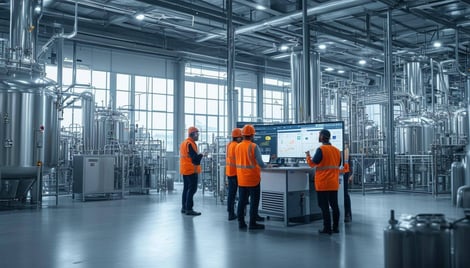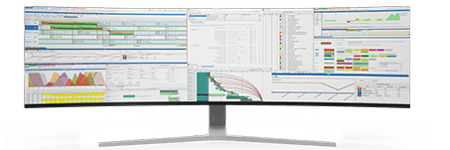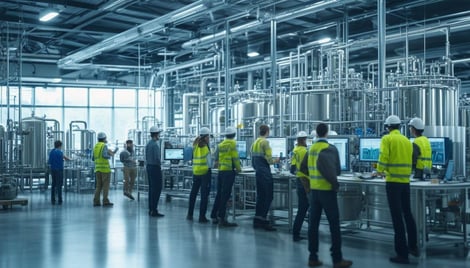
Creating Flexibility in Chemical Manufacturing
Chemical manufacturing faces unparalleled challenges. From supply chain disruptions and stringent regulatory environments to shifting customer demands and sustainability goals, adaptability has become a cornerstone of operational success. As a Manufacturing IT Manager in a chemical manufacturing facility, you are uniquely positioned to drive the digital transformation that fosters flexibility across operations.
Integrating advanced planning and scheduling software, such as PlanetTogether, with enterprise systems like SAP, Oracle, Microsoft, Kinaxis, or Aveva can be a game-changer in achieving this adaptability.

Understanding the Need for Flexibility
Flexibility in chemical manufacturing refers to the ability to quickly respond to changes in production demands, raw material availability, or market conditions without compromising efficiency or product quality. This adaptability is crucial for maintaining competitive advantage in an industry characterized by:
Volatile Raw Material Costs: Fluctuations in commodity prices demand responsive planning and real-time cost analysis.
Complex Product Portfolios: Managing numerous SKUs with varying formulations and compliance requirements increases operational complexity.
Stringent Regulatory Requirements: Adapting to evolving global and local regulations requires robust tracking and reporting mechanisms.

The IT Manager’s Role in Building Flexibility
As an IT Manager, your responsibility goes beyond maintaining IT infrastructure; you are a strategic enabler of innovation. Leveraging integrated digital tools and platforms, you can:
Facilitate Real-time Decision-making: Provide actionable insights through integrated data systems.
Optimize Resources: Ensure that production schedules align with equipment availability and maintenance cycles.
Enhance Collaboration: Break down silos by enabling seamless communication across departments and geographies.
![]()

Why Integrate PlanetTogether?
PlanetTogether Advanced Planning and Scheduling (APS) software is purpose-built for manufacturing environments, offering capabilities that align perfectly with the needs of chemical production facilities. When integrated with enterprise systems like SAP, Oracle, Microsoft Dynamics, Kinaxis, or Aveva, it unlocks unparalleled value:
1. Enhanced Scheduling Accuracy
Chemical manufacturing often involves complex, multi-step processes that require precise sequencing. PlanetTogether’s APS ensures optimized scheduling by considering constraints like batch sizes, equipment availability, and regulatory compliance. When integrated with SAP or Oracle ERP systems, real-time updates on inventory levels and order priorities ensure that schedules remain dynamic and actionable.
2. Improved Resource Allocation
Integration with Aveva’s manufacturing execution systems (MES) enables detailed tracking of equipment performance, maintenance schedules, and energy consumption. This real-time data feeds into PlanetTogether, ensuring that resources are utilized efficiently without risking downtime.
3. Data-Driven Supply Chain Optimization
By connecting PlanetTogether with Kinaxis’s supply chain planning tools, IT managers can ensure seamless collaboration between production schedules and upstream or downstream logistics. This integration supports agility in managing raw material shortages, optimizing transportation, and minimizing lead times.
4. Streamlined Compliance and Reporting
Chemical manufacturers must adhere to stringent environmental, health, and safety (EHS) regulations. Integrating PlanetTogether with Microsoft Dynamics 365 allows you to automate compliance checks and generate comprehensive reports for audits, saving time and reducing the risk of non-compliance.

Key Steps to Implementing Flexible Operations
To maximize the benefits of integrating PlanetTogether with your enterprise systems, follow these steps:
1. Assess Operational Pain Points
Begin by identifying bottlenecks and inefficiencies in your current processes. Is your production constrained by machine downtime? Are you experiencing delays due to manual scheduling? A thorough assessment will help you prioritize areas where flexibility is most needed.
2. Leverage Existing IT Infrastructure
Ensure compatibility between PlanetTogether and your existing systems. For example, if you are running SAP ERP, assess the integration points for data exchange, such as production orders, inventory levels, and master data.
3. Implement in Phases
A phased approach allows for smoother adoption. Start with a pilot project focusing on a single production line or product family. Use the insights gained to refine your processes before scaling.
4. Train Your Team
Invest in training programs to familiarize your team with the integrated tools. Empowering employees to leverage these systems ensures better user adoption and higher ROI.
5. Monitor and Optimize
Flexibility is an ongoing journey. Continuously monitor KPIs such as schedule adherence, throughput, and lead times. Use the data to identify new areas for improvement and adjust your systems accordingly.
Challenges and Solutions
While the benefits of integration are clear, challenges such as resistance to change, data silos, and interoperability issues can arise. Here’s how to address them:
Resistance to Change: Engage stakeholders early in the process and highlight the benefits of integration for their specific roles.
Data Silos: Invest in middleware or APIs that facilitate seamless data exchange between systems.
Interoperability Issues: Work closely with software vendors to resolve compatibility challenges and ensure smooth implementation.
Creating flexibility in chemical manufacturing is both an art and a science. As a Manufacturing IT Manager, you play a pivotal role in orchestrating this transformation. By integrating PlanetTogether with ERP systems like SAP, Oracle, Microsoft, Kinaxis, or Aveva, you can build a resilient and adaptable operation that meets the demands of today and tomorrow.
Invest in the tools and processes that drive flexibility, and watch your facility thrive in an ever-changing industrial landscape. Are you ready to take your manufacturing operations to the next level? Contact us today to learn more about how PlanetTogether can help you achieve your goals and drive success in your industry.
Topics: PlanetTogether Software, Integrating PlanetTogether, Reduced Downtime, Chemical Manufacturing, Improved On-time Delivery Performance, Increased Scheduling Efficiency




















LEAVE A COMMENT